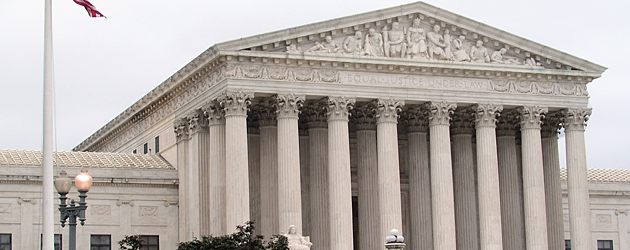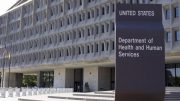By: Lisa Keen/Keen News Service—
The U.S. Supreme Court will hear two cases next week that test the degree to which employers may use their personal religious beliefs to deny certain health coverage for employees. Neither case involves any LGBT-related health coverage; but the decisions in both may affect whether employers will be able to cite religious beliefs to deny such services as alternative insemination and gender reassignment.
The cases, Sebelius v. Hobby Lobby Stores and Conestoga Wood v. HHS, involve employers asserting religious beliefs as grounds for denying health insurance coverage for birth control. Both take issue with the Affordable Care Act. Hobby Lobby challenges the ACA implementing regulations that require employer health coverage plans provide women on their plans with the “full range” of “contraceptive methods.” Those regulations also authorize an exemption for “religious employer” and “religious non-profit organizations that have religious objections to providing coverage for some or all contraceptive services.”
“A religious employer,” noted HHS’s brief to the Supreme Court, “is defined as a non-profit organization described in the Internal Revenue Code provision that refers to churches, their integrated auxiliaries, conventions or associations of churches, and the exclusively religious activities of any religious order.” [pullquote]Neither case involves any LGBT-related health coverage; but the decisions in both may affect whether employers will be able to cite religious beliefs to deny such services as alternative insemination and gender reassignment. [/pullquote]
Hobby Lobby Stores and Mardel are two stores challenging the regulations. Hobby Lobby is a national chain of arts and craft supply stores; Mardel is an affiliated chain of Christian bookstores. Both stores are owned by five people (referred to as The Greens) who excluded contraceptive coverage from the health plans for their combined 13,372 employees, saying contraception goes against their religious belief that life begins “when sperm fertilizes an egg.”
The Hobby Lobby-Mardel owners filed the lawsuit, arguing that the 1993 Religious Freedom Restoration Act prohibits government from “substantially burden[ing] a person’s exercise of religion” unless the need to do so addresses a “compelling governmental interest” and is applied in the “least restrictive” way.
The Tenth Circuit U.S. Court of Appeals ruled for the Hobby Lobby-Mardel, saying they do count, under the Restoration Act, as “persons exercising religion” and that requiring them to provide contraceptive coverage does “compromise their religious beliefs.”
HHS is appealing, saying the beliefs held by the owners of the two companies do not justify an exemption for the companies to a “generally applicable law that regulates only those corporations and not their individual owners.”
The second case before the Supreme Court on Tuesday, March 25, Conestoga Wood v. Sebelius, is essentially the same, except that HHS won that case in the Third Circuit Court of Appeals.
The Conestoga Wood company is represented by the Alliance Defending Freedom, which has been involved in pressing a number of lawsuits opposing equal treatment of same-sex couples with marriage licenses. In its brief, the Alliance argues that the ACA is “requiring private citizens to buy contraceptive insurance coverage for other citizens.” Their arguments often echo those used to defend recent efforts to pass bills in various states to allow citizens to discriminate based on various categories (including race, sexual orientation, and gender identity).
“Because citizens exercise religion in every area of their lives,” wrote the Alliance in its brief to the high court, “this Court has recognized that individuals may exercise religion in business and that citizens may join together to exercise religion through corporations.” [pullquote]“Because citizens exercise religion in every area of their lives,” wrote the Alliance in its brief to the high court, “this Court has recognized that individuals may exercise religion in business and that citizens may join together to exercise religion through corporations.”[/pullquote]
The family of Mennonite Christians Norman and Elizabeth Hahn operate Conestoga Wood in Lancaster, Pennsylvania, employing 950 employees making doors and cabinets. The family believes it is immoral to take a human life, including through abortion. Their health plan for employees excluded contraception. The company filed suit, asking for an injunction to avoid the contraception requirement. The Third Circuit identified Conestoga as a “for-profit secular corporation” and said such corporations “cannot engage in religious exercise.”
What LGBT groups say
Lambda Legal and two other groups filed a friend-of-the-court brief in the two cases, saying they agree with the Obama administration that the ACA’s contraception coverage mandate “serve[s] compelling interests in public health and gender equality.” They also argue that allowing commercial enterprises, such as the Hobby Lobby Stores and Conestoga Wood, to be vested with religious protections could be harmful.
“[C]orporate entities do not hold religious beliefs and do not engage in worship,” states the Lambda brief. And paying for health coverage “is not exercise of religion.”
“This Court should reject the Companies’ demands for exemption from rules that protect employees’ ability to make for themselves ‘the most intimate and personal choices a person may make in a lifetime,’” including “decisions concerning intimate adult relationships….”
Allowing these commercial employers to claim a religious exemption, said Lambda, “would open the door to increased use of religion to deny LGBT persons, those with HIV, and other vulnerable minorities equal compensation, health care access, and other equitable treatment in commercial interactions.” [pullquote]Allowing these commercial employers to claim a religious exemption, said Lambda, “would open the door to increased use of religion to deny LGBT persons, those with HIV, and other vulnerable minorities equal compensation, health care access, and other equitable treatment in commercial interactions.”[/pullquote]
Joining Lambda in the brief were the Gay and Lesbian Medical Association and AFL-CIO group Pride at Work.
The National Center for Lesbian Rights and the National Gay and Lesbian Task Force signed onto a brief filed by the National Women’s Law Center.
U.S. Reps. David Cicilline (D-RIs.), Mark Pocan (D-Wisc.), and Mark Takano (D-Calif.) joined a brief signed by 91 members of the U.S. House.
Marty Lederman, a Georgetown Law professor and regular contributor to scotusblog.com, tackled the potential impact of the Hobby Lobby and Conestoga cases on such things as the “religious freedom” bills that have been springing up in Arizona, Mississippi, and other state legislatures. Lederman said the eventual decisions are likely to have a “profound effect upon how other courts treat state and federal [Religious Freedom Restoration Act, RFRA] claims in the commercial sector going forward.”
“If the Court were to hold that RFRA requires an exemption in these cases—and were to hold, in particular, in the case brought by a very large for-profit employer, that the law substantially burdens plaintiffs’ religious exercise and that the government lacks a compelling interest in denying religious exemptions—that would be a groundbreaking departure from the judiciary’s (and Congress’s) historical practice, one that could pave the way for claims for ‘myriad exceptions flowing from a wide variety of religious beliefs’ (Lee) by commercial enterprises with respect to many other statutes, including nondiscrimination requirements, zoning regulations, taxes, and so on.”
The Supreme Court will hear oral arguments in the cases on March 25.
© copyright 2014 by Keen News Service. All rights reserved.








